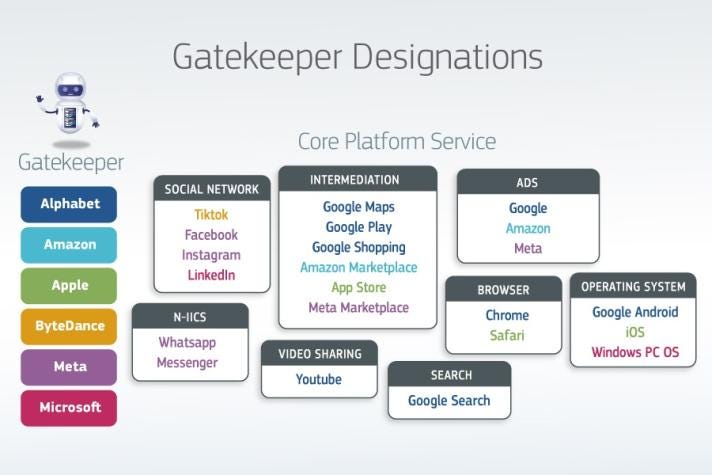Why Monopolies Hate Repair
The fight to repair and the fight against monopolies are one and the same. Also: Would you pay $800 for a VR headset repair? Apple thinks so!
This week, businesses and activists alike called out major tech firms in an open letter. The complaint? Companies like Meta and Google are non-compliant with the European Union's Digital Markets Act (DMA), a law set to go into effect in March of this year which could put these internet giants on the hook for legal action and fines.
The intent of the DMA is to create fairer competition in the digital market by preventing large online platforms from abusing their market power. And oh yeah, the DMA was proposed back in 2020 which makes you think these companies would have enough time to adjust (sound familiar?).
The EU calls these companies capitalizing on non-competetive practices “gatekeepers” because of their ability to control markets, typically through some entry point into a market. Apple’s App Store is an example, where the company can control how users interact with app makers, influencing other businesses through their control of the platform. The power of platforms like the App Store is nothing new, and Apple has been facing backlash for its monopolistic behaviors.
Companies like Epic Games (the creators of Fortnite) and Beeper (a messaging service which would rid of the dreaded green text bubble) have been taking Apple to task for using its App Store as a way to squeeze extra profits out of businesses and consumers alike. In the case of Epic Games, Apple wanted them to use its native App Store payment system so they could take a cut of the profits. For Beeper, Apple has been doing their best to make sure their platform doesn’t succeed by making integration with iMessage difficult or impossible. While their public stance is about privacy, there might be some other motives involved with squashing an iMessage competitor. Let’s see…maybe we can think of a couple. 🤔
Moats and walled gardens
You’re probably wondering, what does the App Store have to do with the right to repair? A lot, actually. Suppressing repair is all about stifling competition and concentrating market power in the hands of manufacturers. By denying customers access to schematic diagrams or diagnostic software, firms like Apple or John Deere not only ensure that their “authorized repair providers” vacuum up the bulk of the repair business and elbow out independent providers, then can also structure repair costs in ways that make it more economical to replace rather than repair devices and equipment. As it turns out, the tactics that companies use to thwart repair are inseparable from their monopoly power.
Cory Doctorow describes monopolies simply, writing “a monopoly is a company with power. Economists who talk about monopolies mean companies that ‘can act independently without needing to consider the responses of competitors, customers, workers, or even governments."
In the case of the App Store, Apple wants to exclude competitors and thereby maximize its profits while convincing - no, requiring - users to stay within its ecosystem. Often called walled-gardens or moats, exclusionary online marketplaces and ecosystems like the App Store or Amazon’s Marketplace keep customers from using non-approved services or apps. The arguments in favor of that often center on quality, privacy and security, but the real motivator is money. Locking out competition for your marketplace ensures you - as the owner - can write the rules, name your price(s) and ensure the highest profits.
Stepping back, this same motivation to maximize profits is what also leads companies to restrict repairs.
These actions can take the form of restricting use of repair services outside of the company, or can be as simple as designing unrepairable products that force you to replace rather than repair.
Recently, high profile legal cases are shining a light on the kind of rigged markets that are weighing down broad sectors of the economy. There’s the suit by the founders of Kytch, a startup that offered a device to McDonald’s franchise owners that made it easier for them to maintain and fix their McFlurry soft ice cream machines, made by the firm Taylor - piercing the machines opaque, complex and error-plagued software. According to documents released in that suit, it is alleged that Taylor and McDonald’s conspired to force franchise owners to reject the Kytch product.
Then there’s the class action lawsuit filed by farmers against John Deere. Allegations in that case center on the company’s use of software locks and restrictions on access to diagnostic software and information to make owner and independent repair of Deere equipment impossible, concentrating market power in the hands of Deere’s network of highly-consolidated independent dealerships.
In other words: the fight to repair and fight against monopoly power are intertwined. Ultimately, we won’t win one (the right to repair) without defeating the other (monopolies and extreme concentrations of market power).
That’s why the Digital Markets Act is a bright spot for those hoping to see a more fixable future, promising penalties that could reduce or end the kinds of corporate behavior that stifle competition in the market for repair and that hurt consumers broadly by constraining choice and competition.
What can you do about it? Well, you can start by complaining to the FTC which is a regulator than can do something about it and that’s in the process of weighing new rules that foster a right to repair.
Other News
Apple’s virtual reality headset repairs won’t come cheap for a product that retails at $3499. Apple disclosed this week that a cracked cover will run $799, and AppleCare+ will cost users $499 for two years. With AppleCare+, repairs for accidental damages will cost $299 per incident.

40% of garments produced annually remain unsold, prompting calls for transparency, reduced production, and higher financial levies for the fashion industry to address overconsumption and curb fashion’s environmental impact.
Samsung is making DIY fixes easier for some of its TVs, including The Frame TV and flagship foldable phones. DIY users can make repairs using common tools like a screwdriver for issues related to picture, power, WiFi, and sound. Repair guides and parts are available for some of Samsung's 2023 sound bars. Encompass Supply Chain Solutions is Samsung's partner for distributing parts. Parts for foldable phones are expected to be available at the end of next week. Encompass offers parts for 2023-model displays, soundbars, TVs, and more, including Galaxy products.
Profit maximization is hindering a real circular economy, and fundamental changes in our societal and economic structures will need to come first says Paul Abela. Challenging the dominance of capitalism and the profit motive remains outside the mainstream, but will be essential for making this change, says Abela.
The repair café is turning 15 years old, cementing its staying power as an essential form of community repair. If you or someone you know is associated with a repair café send them this link to design a flag for the global Repair Café XL party in October.
Listen to 404Media’s podcast on Google changing on its public right to repair stance.

Appliances were the ‘canary in the coalmine’ in uncovering our increasing disposability in the digital age. “Digital Anthropologist” Giles Crouch recently explored the erosion of physical and digital ownership, but says the upshot of the right to repair movement “will be higher quality products that are better for the planet and for society.”
Shares in iRobot Corp. tumbled 30% following a Wall Street Journal report that the European Commission plans to block Amazon's $1.7 billion takeover of the company, with concerns raised over potential antitrust issues and Amazon's influence in the market for robotic vacuum cleaners.
Framework Laptop 16 review: two weeks with the ultimate modular laptop. Never has a computer company made a laptop so user-repairable, so customizable, so… modular. Never have I owned a laptop that’s a workhorse by day, physically transforms into a competent gaming PC by night, then morphs into an RGB-LED-studded five-screen DJ controller when the mood strikes. Never have I swapped out a laptop’s entire butt for a bigger one containing a discrete graphics card, then powered the whole rig with a world’s first 180-watt USB-C PD power supply. And never have I been able to lift out a laptop’s keyboard and touchpad, shift them to the left or right, then add a numpad, or a matrix of dazzling LEDs, or a simple pop of color alongside.
Maine’s right to repair is law…but still faces a long road. Maine's right-to-repair law is now in effect, but the significant changes required by the law may take time. Those changes include creating a database for advanced diagnostic repair data and establishing a state oversight board to ensure automakers’ compliance. Under the law, passed in November with 84% voter approval, automakers face a minimum $10,000 fine for not sharing repair data. But independent repair shop owners in Maine may not see a difference until 2025 when the oversight board is stood up.
RI reps sponsor right to repair bills. The Rhode Island House introduced two right to repair bills: the Digital Electronics Right to Repair Act (2024-H 7095) is sponsored by Rep. Rebecca Kislak and requires manufacturers to provide tools, parts, and manuals for electronic repairs. The Agricultural Equipment Right to Repair Act (2024-H 7229), sponsored by Rep. Mary Ann Shallcross Smith ensures access to information and tools for repairing electronics-enabled agricultural equipment. Both bills seek to prevent anti-competitive practices, reduce waste, and support local repair businesses. Rhode Island is just the latest





